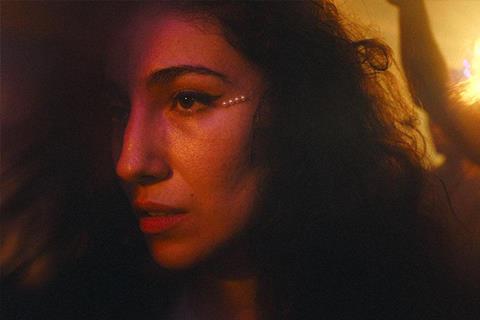Mehdi M. Barsaoui directs Fatma Sfar in an electric performance as a Tunisian woman on an unexpected journey of reinvention

Dir/scr: Mehdi M. Barsaoui. Tunisia/France/Italy /Saudi Arabia/Qatar. 2024. 123 mins.
What would you do if you were given the opportunity for another life, a clean slate – especially if your own was downtrodden, cleaning toilets with little prospects for anything else in arid Tozeur on the edge of Tunisia’s Sahara? Mehdi M. Barsaoui returns after the success of 2019’s Cesar-winning A Son with Aicha, a fantasy/melodrama and woman’s film about a lower-class hotel worker who grabs that chance with both hands and heads for the bright lights big city of Tunis.
Audiences at home and in the region will enjoy all the possibilities Barsoui gives his leading lady
Playing in Venice’s Horizons section, Aicha features a magnetic performance from newcomer Fatma Sfar as Aya/Amira/Aicha in a drama-drenched film which also takes in police and government corruption in a post-revolution Tunis. Undoubtedly set for success in Middle-Eastern markets, where it will court a younger audience with similar dreams of liberation, it may be too blunt for arthouse markets elsewhere, although Barsaoui shows himself more than adept at directing unexpectedly tense action sequences. The fact it was inspired – in small part – by a true story will help draw attention.
The main challenge with Aicha is that there are at least three, if not four, stories here, all heightened melodrama, and Barsaoui melds them together in a straight-up dramatic through-narrative focused on Aya (Sfar), her face in tight close-up as she morphs. There are distinctly different shooting styles on display here too, from the crisp interiors of a resort hotel in Tozeur to the arid and majestic landscape there and on to Tunis, with its electric colours, sounds, and constant, whirling movement. Barsaoui sets himself and his technical team a challenge – they deliver, but a two-hour running time is too much for the format, and the framework of the film can’t always support it.
He starts with Aya, an unschooled chambermaid who has been paying off her parents’ debts since the age of 14. Every day she takes the minibus to the international hotel in Tozeur, where guests feast on what look like bionic prawns, before returning home to help her mother prepare meals for takeaway delivery. Now her parents want her to marry an older divorcee, just as the thrill of her four-year liaison with the hotel’s married manager is beginning to seem like a one-way street of shame.
So Aya is definitely in a bind when, one day, the mini-bus she is travelling in dramatically plunges off a cliff in a tightly-shot and -edited sequence and she is taken for dead (this happened in real life in Tunisia, although the situation only lasted for a few days). Aya jumps at the opportunity unexpectedly afforded to her. She robs her lover blind, dons a burqa to watch her own funeral and heads for Tunis without any identification, but with the prospect of a new life and all its possibilities.
Things are obviously going to be difficult for Aya, now calling herself Amira, in Tunis with no friends and no papers, but the film takes a huge jump to plunge her into a lurid web of crime and police corruption. In short order, she finds a flatmate, starts drinking vodka and going to clubs – the burqa is swiftly replaced by mini-skirts and midriffs – and becomes involved in a police cover-up surrounding a murder. The investigating police officer (Nidhal Saadi) then gets his own back story, possibly due to him being a big local star, and Amira is robbed and raped, then befriended by a saintly single-mother bakery owner called Hela (Hela Ayed). It’s a lot to take on board, especially for a naive 28 year-old.
“This country has no mercy,” Amira is warned, “especially for a woman like you.” It’s very difficult to pin down exactly what ‘kind’ of women Aya/Amira is, though, as Barsaoui changes her so often. In many ways, that’s a good thing, and there’s little doubt that audiences at home and in the region will enjoy all the possibilities he gives his leading lady, which they can only dream of themselves – although too often for a liberated single woman in Tunis, it’s also the stuff of nightmares.
Production companies: Cinetelefilms, Dolce Vita Films
International sales: The Party Film Sales, sales@thepartysales.com
Producers: Habib Attia, Marc Irmer
Cinematography: Antoine Heberle
Production design: Sophie Abdelkafi
Editing: Camille Toubkis
Music: Amine Bouhafa
Main cast: Fatma Sfar, Yasmine Dimassi, Nidhal Saadi, Hela Ayed
















![[L-R]: Amanda Villavieja, Laia Casanovas, Yasmina Praderas](https://d1nslcd7m2225b.cloudfront.net/Pictures/274x183/6/4/1/1471641_pxl_20251224_103354743_618426_crop.jpg)







